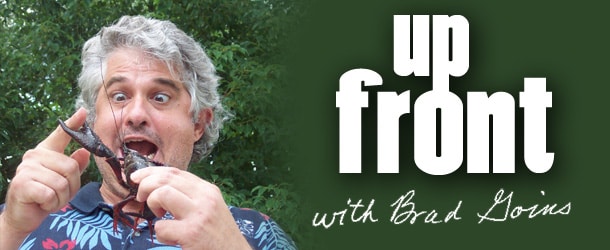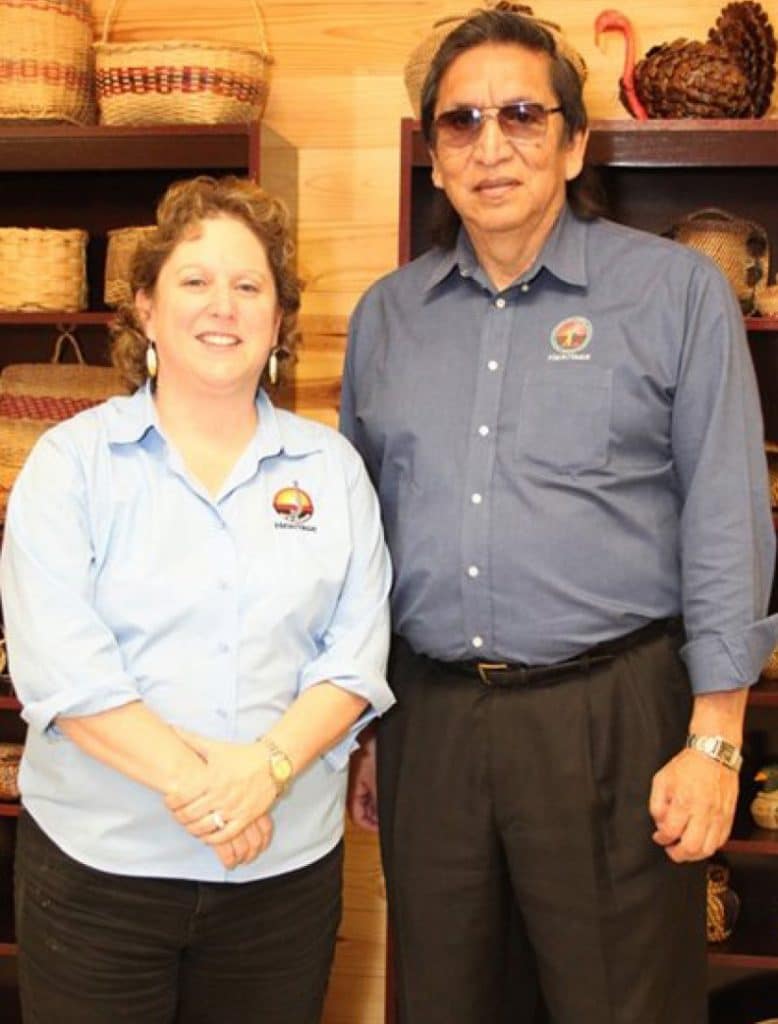A couple of years ago, the Up Fronter wrote a feature story about local DJs Stormi and Wes Guidry, who engineer the Generation Gap show on McNeese station KBYS-FM. I’d heard the two were all but obsessed with being on the cover of Lagniappe Magazine and were promoting the idea on their show. We were able to make their dream come true.
The two have stayed inventive. They’ve just published a comic book titled Amazing Adventures With The Generation Gap: The Day To Day Shenanigans Of Wes And Stormi On KBYS.
They’re shown on the cover wearing Superman suits. The 15 cents price tag on the cover isn’t meant to be taken seriously. Everything about this publication mimics the comic books of Wes’ youth — the “price,” the title “Amazing Adventures” and the little retro ads for things like Sea-Monkeys and the “Polaris Nuclear Sub” that are scattered through the comic. Like many boys who were kids in the ‘60s, I clocked lots of time looking at the ads in the backs of comic books: ads that promised things such as two full divisions of plastic soldiers for $1.99.
Most of the comic is made up of 3 by 5 photos of Stormi and Wes talking with each other in the studio by means of dialogue bubbles. Sometimes the jokes are ones commonly seen in memes. But some of the dialogues seem to have been thought up by the two. At any rate, they’re often pretty funny. Here are a couple of examples. (Even though all the dialogue in the publication is in the standard comic book style of all capitals, for these examples, I’ll use capitals and lower case. I’ll keep the exclamation points.)
Stormi: What does “IDK” stand for.
Wes: I don’t know.
Stormi: OMG! Nobody knows!!
Stormi: OK — truth. Do you tell your pet “I’ll be back soon” when you leave the house?
Wes: Nope.
Stormi: You should. They do have feelings.
Wes: I still don’t.
Stormi: Why not?
Wes: I don’t have any pets.
The big running gag in the comic is Stormi’s worship of Joe Cocker’s music. Wes only challenges this passion one time — in a cartoon in which Stormi disguises her voice, calls the studio and tells Wes he “must” play Joe Cocker. On this occasion, he declines.
The two often wear tie-dye shirts promoting their show and give a shirt away every Thursday. Tie-dye makes frequent appearances in this little book. There’s also info about Stormi and Wes’ “Friends Club,” which is apparently their alternative to a fan club. If you are a super-fan, the back cover of the comic is taken up with a large photo of the two that could be used as a mini-poster.
I don’t know how you can get a copy of this comic or even if it’s possible to get a copy. But my suggestion is that you call Stormi and Wes one weekday morning between 6 and 9 am and ask them about it. I’m sure they’ll be pleased to get the call.
Area Couple Honored By LEH
The 2020 Humanities Awards winners of The Louisiana Endowment for the Humanities were just announced. The awards honor individuals and organizations who have made significant contributions to the study and understanding of the humanities.
Two of the winners come from our area: Bertney Langley, a Coushatta storyteller, and his wife, Linda, a retired anthropology professor from McNeese State University who serves as the Coushatta Tribe’s historic preservation officer. The two have dedicated their lives to the preservation of Coushatta culture, history and language. They’ve also spread awareness of the Coushatta Tribe through their educational efforts. Bertney and Linda were recipients of the Lifetime Contributions to the Humanities Award.
Another winner of this award has devoted his work to a matter that’s central to SWLA culture. Warren Perrin has long been active in recognition of the history, culture and contributions of Acadians and of the wrongs committed by the British with the expulsion of the Acadians from Canada. Perrin is a prominent supporter of French language revitalization efforts in Louisiana; for 16 years he’s been president of the Council on the Development of French in Louisiana (CODOFIL). He’s also been active in supporting the creation of language scholarships at the University of Louisiana at Lafayette.
Other awards of interest to people in our area include the Champion of Culture Award, which went to the LSU Press. Now in its 85th year, the LSU Press has published four books that have won Pulitzer Prizes. The press publishes more than 70 titles per year.
The Humanities Documentary Film of the Year Award went to the documentary Mossville: When Great Trees Fall, which was directed by Alexander Glustrom. The nearby town of Mossville, which was founded by freed slaves and is inhabited by their descendants, is surrounded by 14 petrochemical plants. Living conditions in the tiny community have generated a great deal of controversy. The documentary contrasts the positions of those who’d like to leave their ancestral home and at least one man who refuses to abandon Mossville.
The Winner of the 2020 Humanist of the Year was N.O. native Terence Blanchard, the composer of the opera Fire Shut Up in My Bones, which was the first opera by a black composer to be staged at the New York Metropolitan Opera. Blanchard and the other winners will be honored on May 7 at the LEH Bright Lights Awards Dinner in New Orleans.
Shuler Welcomed Weirdness
In the winter issue of 64 Parishes magazine, an article by Lake Charles’ Lucie Monk Carter titled “The Lake Charles Special” focuses on the life and career of the city’s longtime producer of Cajun recordings, Eddie Shuler. The story’s subheading reads “Record producer Eddie Shuler welcomed weirdness into Goldband Studio.”
The story begins by stating that Shuler was no great fan of Cajun music prodigy Iry LeJeune when he heard him sing and play the accordion on the radio in 1948. Shuler, who hailed from Texas, didn’t care for Cajun French music and pitied the nearly blind LeJeune. But he took note when large numbers of KPLC listeners tuned in for LeJeune’s on-air performances, which they felt sounded “eerie” (but in a good way) and delivered music “which seemed to drift across the radio waves from another time.”
LeJeune had grown up listening to the records of Amédé Ardoin. His main influence was Cajun music as it had been played 20 years earlier.
Shuler had founded Goldband Records in 1945 to promote his group The All-Star Reveliers. As Carter writes, “he had no other clients” until he took on LeJeune.
In a 1984 interview with Chris Strachwitz of the Arhoolie Foundation, Shuler said he’d made this deal with LeJeune: “I’ll put out one record on you. If it makes money, you and I are in business. If I don’t make no money, you’ll have to find somebody else.”
Shuler and LeJeune made the record on a jingle cutter owned by KAOK. They paid for it with whisky.
LeJeune “keened” into the microphone, “Oh, jolie, comment moi je vas faire?” He was recording his version of Ardoin’s “La Valse de Amitiés.” Carter says the disc “was an unexpected hit. Cajun listeners, who actually didn’t want to be homogenized, loved the Cajun French, considering it a return to form.”
She quotes some comments Shuler made to Strachwitz about the release: “The first record made $70 dollars … Back in those days, when people worked all day long for two dollars, that was a lot of money.”
Carter tells some Schuler stories many readers will know, such as those about Dolly Partin and Stu Phillips. But I had not heard the story about Boozoo Chavis before.
During a 1954 recording session, Chavis was quarreling with his backing band, whose members claimed that Chavis wasn’t playing in beat with them. Schuler figured a liquid solution to the problem might work best, and ordered half a gallon of Seagram’s Seven.
Chavis must have indulged just a wee bit too much, for as the band reached the end of a take of “Paper in my Shoe,” a drunken Chavis fell off his stool. Everyone in the studio burst into laughter. Although Chavis fell all the way down, he held up his German button accordion, keeping it safely elevated above the floor. Shuler reckoned that in spite of all the drinking, the take of the song was the best one yet. He knew he could eliminate the laugher at the end just by fading out the song. And thus the Zydeco standard “Paper in My Shoe” came into being.
When Shuler died in 2005, Goldband was the oldest independent record label in the U.S. Carter’s appraisal is that “in the Goldband studio, weird was welcome.” She argues that Schuler had a keen sense of “Cajun excess” and “marketed it to the masses.”

















Comments are closed.